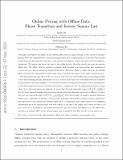Online Pricing with Offline Data: Phase Transition and Inverse Square Law
Author(s)
Bu, Jinzhi; Simchi-Levi, David; Xu, Yunzong
DownloadAccepted version (2.814Mb)
Open Access Policy
Open Access Policy
Creative Commons Attribution-Noncommercial-Share Alike
Terms of use
Metadata
Show full item recordAbstract
<jats:p> This paper investigates the impact of pre-existing offline data on online learning in the context of dynamic pricing. We study a single-product dynamic pricing problem over a selling horizon of T periods. The demand in each period is determined by the price of the product according to a linear demand model with unknown parameters. We assume that before the start of the selling horizon, the seller already has some pre-existing offline data. The offline data set contains n samples, each of which is an input-output pair consisting of a historical price and an associated demand observation. The seller wants to use both the pre-existing offline data and the sequentially revealed online data to minimize the regret of the online learning process. We characterize the joint effect of the size, location, and dispersion of the offline data on the optimal regret of the online learning process. Specifically, the size, location, and dispersion of the offline data are measured by the number of historical samples, the distance between the average historical price and the optimal price, and the standard deviation of the historical prices, respectively. For both single-historical-price setting and multiple-historical-price setting, we design a learning algorithm based on the “Optimism in the Face of Uncertainty” principle, which strikes a balance between exploration and exploitation and achieves the optimal regret up to a logarithmic factor. Our results reveal surprising transformations of the optimal regret rate with respect to the size of the offline data, which we refer to as phase transitions. In addition, our results demonstrate that the location and dispersion of the offline data also have an intrinsic effect on the optimal regret, and we quantify this effect via the inverse-square law. </jats:p><jats:p> This paper was accepted by Omar Besbes, revenue management and market analytics. </jats:p><jats:p> Supplemental Material: The data files and online appendices are available at https://doi.org/10.1287/mnsc.2022.4322 . </jats:p>
Date issued
2022Department
Massachusetts Institute of Technology. Department of Civil and Environmental EngineeringJournal
Management Science
Publisher
Institute for Operations Research and the Management Sciences (INFORMS)
Citation
Bu, Jinzhi, Simchi-Levi, David and Xu, Yunzong. 2022. "Online Pricing with Offline Data: Phase Transition and Inverse Square Law." Management Science, 68 (12).
Version: Author's final manuscript